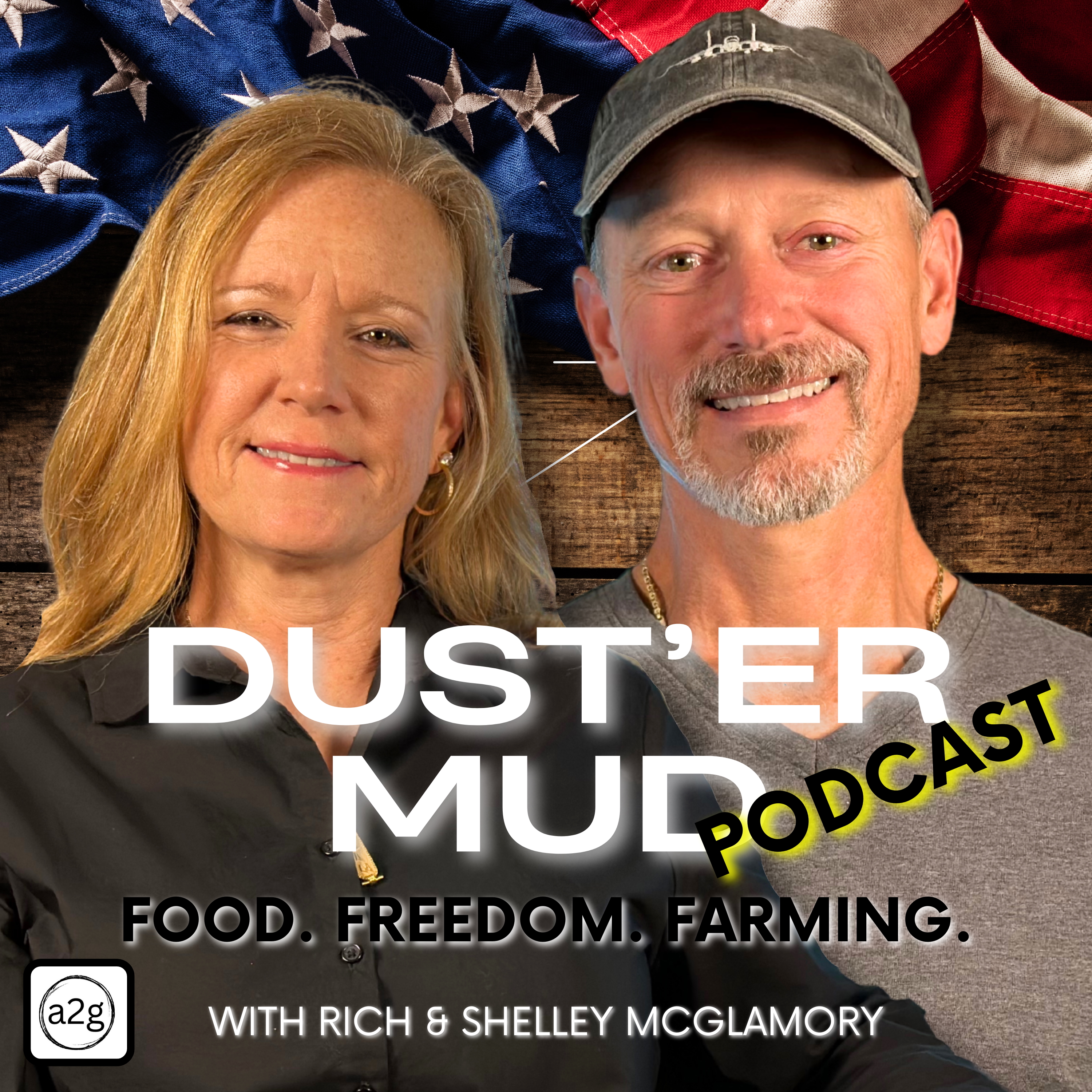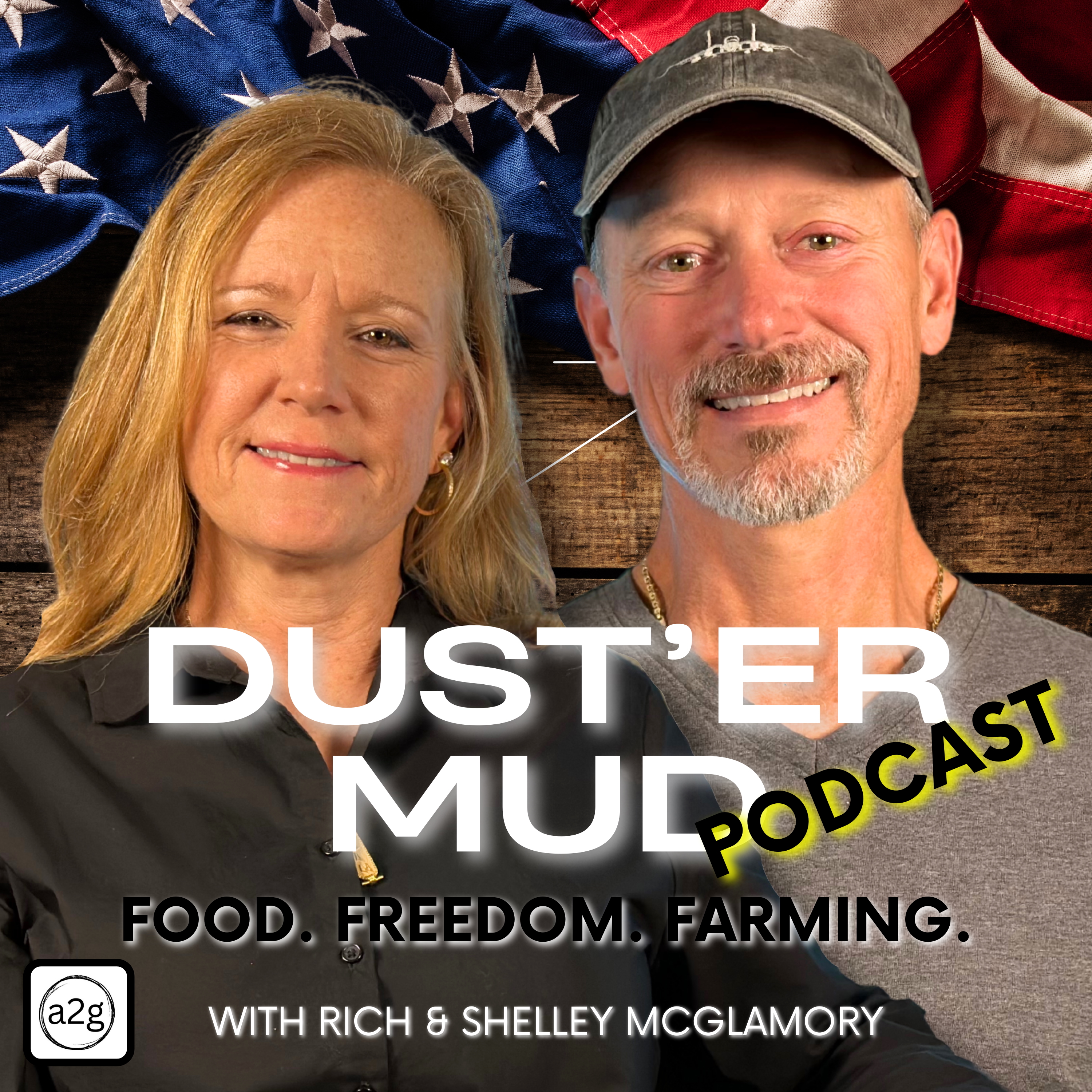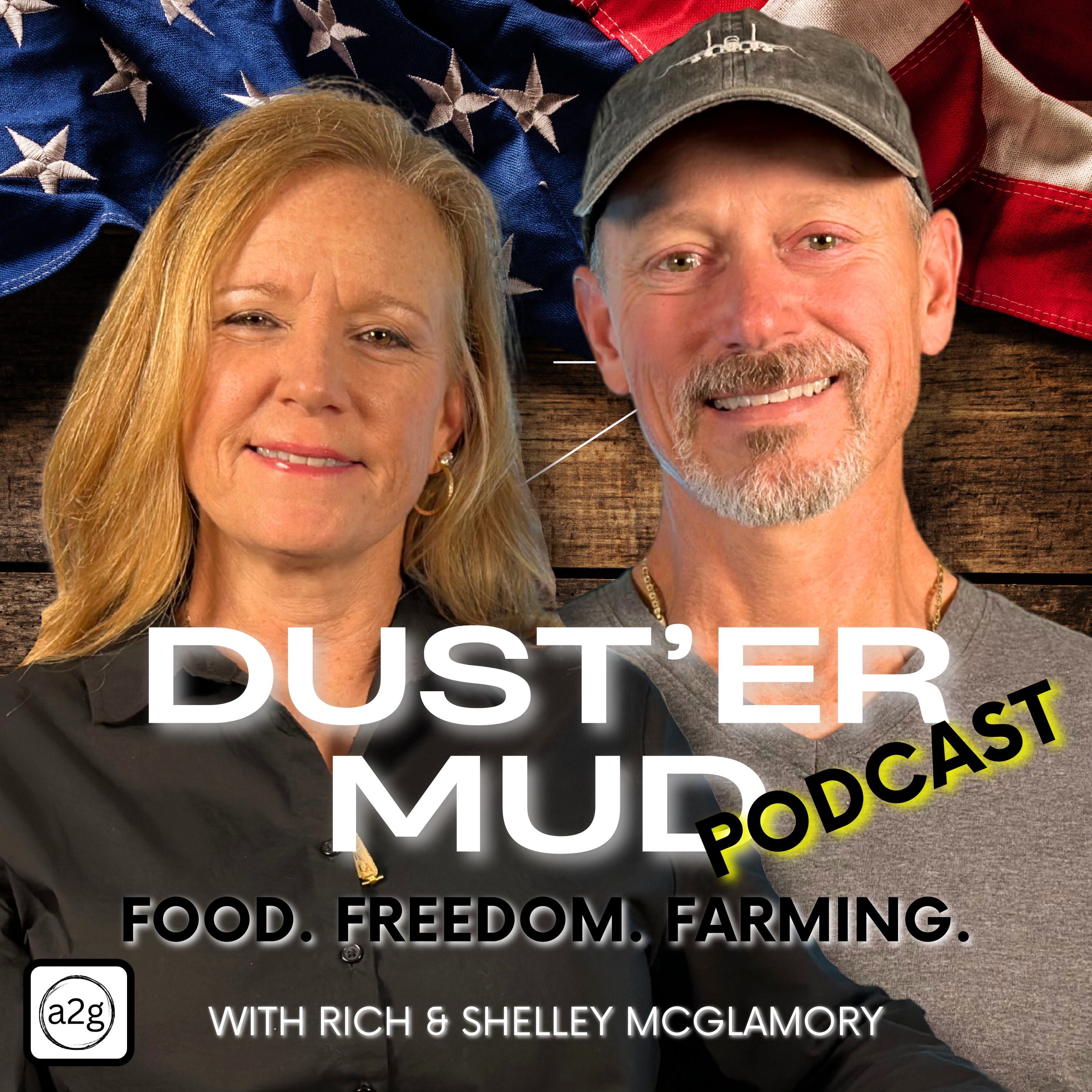Episode Transcript
[00:00:00] Speaker A: There are other things that we have said no to. Donkeys and llamas, horses, alpacas, ostriches, and emus.
[00:00:14] Speaker B: Hi, everybody. Welcome back to the Duster Mud podcast. This is episode 27 Q and a Monday.
[00:00:21] Speaker A: We suck at saying no.
[00:00:23] Speaker B: Totally suck at saying no. We do.
Well, dude, we've got 160 acres, and we set our own rules. And whenever you can set your own rules, and you can have whatever you want. Okay. We've come from a space of having lived in base housing.
[00:00:40] Speaker A: Yeah. In base housing, you're allowed to have two animals as long as they're not exotic.
[00:00:45] Speaker B: Yeah. And now we can have whatever we want.
[00:00:48] Speaker A: That's true.
[00:00:50] Speaker B: Like, almost literally whatever we want.
[00:00:53] Speaker A: Yeah.
[00:00:56] Speaker B: It'S hard to say no.
[00:00:57] Speaker A: Right?
[00:00:58] Speaker B: So we got a question. Yeah.
[00:01:00] Speaker A: We were talking about pricing and how we do our pricing, and the viewer asked, why don't you raise your own pigs? Like, from piglets? And so we thought that we would chat just a little bit about why we don't pharaoh is what that's called when you raise your own piglets. Why don't we pharaoh piglets?
[00:01:17] Speaker B: So the things required to ferro piglets are obviously a mama and a daddy. Yeah, or a mama and UAI artificially inseminate.
[00:01:27] Speaker A: Yeah.
[00:01:27] Speaker B: And there's a lot to it.
[00:01:30] Speaker A: As we were building the farm, we seriously considered farrowing our own pigs. One of the main reasons why we wanted to do it was the idea of sustainability. We like the thought of being able to have everything self contained. We have a bull with our cows, so we breed our own beef. We have rams with our ewes. We breed our own sheep. We have even hatched some of our own chickens, our own eggs. We have roosters with our hens. So the concept of sustainability is an important thing to us.
[00:02:11] Speaker B: However, the infrastructure and the things required and just the entire system required in order to have a sow or multiple sows, and a boar hog. Now, we raise pigs to about 300 pounds.
They are only about eight months old at that time.
A boar of the breed that we raise can get upwards of 600 pounds. That's a whole different animal than a 300 pound feeder.
[00:02:45] Speaker A: And the way we raise our pigs, we rotate them through the forest. And that was one of the things that we wanted to do from the beginning, from the get go, was that we would have our pigs and we would rotationally graze them basically through our forests. And so when we really started looking at the concept of having a breeding stock of pigs, now you're really looking at more of an infrastructure set up where you have an area for a boar and an area for sows, and those are different. They can't be together all the time and have another area for the piglets that we're raising out to butcher.
[00:03:26] Speaker B: And the more we thought about it, and we really, really did hardcore consider doing it, but the more we thought about it and how are we going to make this work with the program that we want? We finally said no.
[00:03:44] Speaker A: It is the first thing on the farm that we said no to, truth. So we've said yes to a lot of things. We started with guineas and ducks and chickens and dogs, and then came the sheep and the pig, and then the cows and more sheep and more sheep.
So we said yes to a whole lot of things. And farrowing was the first thing. Milk, really? Oh, yeah. The milk cows showed up, too.
[00:04:13] Speaker B: I mean, we said yes. We didn't.
[00:04:15] Speaker A: Yeah, we said yes to the.
[00:04:16] Speaker B: We said yes to the milk cows.
[00:04:18] Speaker A: Yeah. Farrowing hogs or ferrowing piglets was the first thing that we said no to. And I'm glad.
[00:04:26] Speaker B: I'm glad, too. Another thing about farrowing pigs, it is not easy.
[00:04:31] Speaker A: No.
[00:04:32] Speaker B: It is not an easy venture. And the piglet mortality can be high.
[00:04:38] Speaker A: Can be.
[00:04:39] Speaker B: The struggles are very real with breeding pigs.
[00:04:42] Speaker A: It's very easy for the mamas to lay down on the piglets, and a lot of folks end up losing piglets throughout the time. And really, our whole concept with building the farm was that it needs to be something that just she and I can do by ourselves.
[00:05:04] Speaker B: Yeah.
[00:05:04] Speaker A: And so as you add more and more and more enterprises, that just obviously adds to what the two of us have to accomplish.
[00:05:15] Speaker B: And in the middle of the decision, the really cool thing that came along was our friends Rick and Jill Norton at Ozark's heritage farm, down just a little ways from us. And they came into our life at an amazing time. And they grow amazing piglets that we now are blessed with being able to bring onto our farm and raise. And they are good at it.
[00:05:41] Speaker A: Yeah. They pharaoh Berkshires, pure blood, high quality Berkshires, and it's just been amazing to be able to get our piglets from them.
[00:05:50] Speaker B: Yeah. And that just relieves all of that whole stress of where do we source our pork from? And when they came into our lives, the answer was real easy. These guys are good at it. Let's support them. They'll support us. And we have a symbiotic relationship.
[00:06:10] Speaker A: Yeah. And if ever we change our minds, it would be very easy to add that as an enterprise not saying it would be easy from a management perspective, but to decide, okay, we're going to do this and then start doing it.
We could do that, definitely.
[00:06:28] Speaker B: I don't see that. I am glad that we said no to farrowing pigs. I really am at this point.
[00:06:35] Speaker A: So that brings up a good question.
[00:06:37] Speaker B: What?
[00:06:38] Speaker A: Looking back now, we've been doing this for two and a half years. Looking back on it throughout the two and a half years, if you had to do it over again, would you say no to other things? Yes.
Okay, so what things would you say no to? Guineas. Okay.
[00:06:59] Speaker B: I would say no to guineas.
[00:07:00] Speaker A: So why?
[00:07:03] Speaker B: Well, because a lot of people get them on their property, homestead, farmstead, farm, yard for ticks, and they go ticking and they help eat the ticks. Okay.
Mowing works, too.
[00:07:22] Speaker A: We found that with our property, it's 160 acres and the guineas just couldn't have that much effect on things. So do they eat ticks? I'm sure that they do, yeah. The thing that we found works the best is mowing. Keeping the grass and brush mowed down works way better at controlling the ticks than the guineas.
[00:07:47] Speaker B: Yeah. And there's no on 160 acres and a whole lot of it is woods and briars and we've got some blackberries and stuff like that. There is not an amount of guineas that's going to help in our part of the world with the ticks.
[00:08:00] Speaker A: They don't do a great job at ticks. But why would you say no?
[00:08:04] Speaker B: Because they're loud. Come back, come back, come back, come back.
[00:08:08] Speaker A: Yeah.
[00:08:09] Speaker B: Oh, they're loud.
We started with 30 quickly. We only had about 17. Those lasted quite a long time. We went down real quick to seven for a long time. And there was one demised a couple of weeks ago. Now we're down to two, so we're not very far. But if they don't hush, they're so loud.
[00:08:30] Speaker A: So you would say no to guineas?
[00:08:31] Speaker B: I would.
[00:08:32] Speaker A: Is there anything else you would say no to?
[00:08:37] Speaker B: Um, at one point I would have said sheep.
[00:08:43] Speaker A: Okay.
[00:08:44] Speaker B: But my mind is changing.
We changed our program and the sheep are doing fantastic now.
So I want to give it another lambing season and then I would make a determination on that. But there, for a while I would have said sheep, but they're doing really well now.
[00:09:02] Speaker A: They are, yeah.
[00:09:05] Speaker B: What would you say no to?
[00:09:07] Speaker A: I think maybe the ducks.
Although I like the duck eggs because ducks, that's why.
[00:09:17] Speaker B: Yeah, you're right. Ducks are, you are right.
[00:09:19] Speaker A: Are really messy.
[00:09:20] Speaker B: And they really do tear up land and they make it. Once they've been there, they make it to where it's not going to grow anything decent for a while.
[00:09:28] Speaker A: Yeah.
[00:09:29] Speaker B: So ducks. Yeah. I wouldn't get ducks. In fact. Yeah, I agree with you.
I think that's it. I think everything else I'm really happy with.
[00:09:44] Speaker A: There are other things that we have said no to. Donkeys and llamas, horses, alpacas, ostriches and emus.
[00:09:58] Speaker B: Yeah, we're not doing those.
[00:10:00] Speaker A: There have been other things that we.
[00:10:03] Speaker B: Yeah. But they're a little more exotic. But we do say yes to a lot, because we can. If we see that there's an opportunity there, we'll say yes if it doesn't. There are three types of things on this farm. You guard food, make food, or become food.
[00:10:25] Speaker A: So the dogs guard the food.
[00:10:27] Speaker B: Correct.
[00:10:28] Speaker A: The chickens lay eggs. Lay eggs and make food.
[00:10:32] Speaker B: The dairy cows make food.
[00:10:34] Speaker A: Dairy cows make food. The mama use and mama beef cows make food. Make babies. Yeah.
[00:10:40] Speaker B: They make food.
[00:10:41] Speaker A: And then the steers and the meat.
[00:10:44] Speaker B: Chickens and the feeder pigs and such, they become food.
And the geese guard.
And so those are the three things. If you don't fit into those three things, then you don't belong. You don't get to go here.
[00:11:00] Speaker A: Right.
[00:11:02] Speaker B: So that was why we said no to farrowing the pigs and having our own. And mostly it was really just, we don't want to do it. It's a lot.
[00:11:13] Speaker A: Yeah. And so when we say we suck at saying no, we say that in just that we're excited that we said no to one thing.
[00:11:22] Speaker B: We are. We're excited. We said no.
[00:11:24] Speaker A: That one thing was really something that we considered seriously and then said no to.
[00:11:31] Speaker B: And we continue to learn the art of saying no.
[00:11:35] Speaker A: Yeah. We had a dear friend offer some prized chickens the other day.
[00:11:41] Speaker B: Yeah.
[00:11:41] Speaker A: And what did you say?
[00:11:43] Speaker B: No.
I said it so harsh.
It didn't mean to come out harsh. It was just the only way that I could get no out of my face, I think.
No, I don't need anything else to feed right now. So that was the only reason. They were beautiful chickens.
[00:12:02] Speaker A: We're trying to get better at saying no.
[00:12:05] Speaker B: Finding balance in what is necessary or required in order to have the enterprises and the farm that we want and what we can do, all of it has to balance together. And learning our boundaries on what that is, is taking time. But two and a half years into it, I know how to say no to some chickens.
[00:12:29] Speaker A: You don't know how to say it nicely, though.
[00:12:31] Speaker B: No, not yet.
Maybe soon. No. Thank you there.
[00:12:40] Speaker A: We might say no to some garden things this year.
[00:12:44] Speaker B: We might say no to a garden.
[00:12:46] Speaker A: No, I've already got some peppers on the way.
[00:12:48] Speaker B: Oh, okay. He said yes to a garden.
Okay, good.
[00:12:53] Speaker A: But we don't have to do as much or we don't as many things.
[00:12:57] Speaker B: That's true. That's true. Something that's more manageable.
One tomato plant does not look like it's going to make very much. So we have to put in 15 or 30.
Lord have mercy us. Okay, so it is, today is December the 31st, 2023. It is New Year's Eve Eve.
[00:13:21] Speaker A: Happy New Year.
[00:13:22] Speaker B: And we wish each and every one of you a very happy new Year. And we look forward to 2024 and hanging out with you guys.
[00:13:29] Speaker A: Absolutely.
[00:13:30] Speaker B: And until next time. Bye, y'all. Bye.


